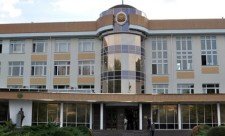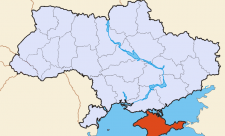 The central event of international life last week was the Eastern Partnership (EaP) summit, regarding which Ukraine had great expectations, in Riga. However, it was not destined to be realized. Europe still doesn’t decide to introduce the visa-free regime while promising once again that it will be as soon as possible. The issue of the annexation of Crimea provoked the strong disagreement among the EaP participants. Eventually, everyone neither won nor lost: Europe continues to play its part, Ukraine puts a brave face on an obviously sorry business, and Putin rubs his hands with satisfaction having another ace up his sleeve.
The central event of international life last week was the Eastern Partnership (EaP) summit, regarding which Ukraine had great expectations, in Riga. However, it was not destined to be realized. Europe still doesn’t decide to introduce the visa-free regime while promising once again that it will be as soon as possible. The issue of the annexation of Crimea provoked the strong disagreement among the EaP participants. Eventually, everyone neither won nor lost: Europe continues to play its part, Ukraine puts a brave face on an obviously sorry business, and Putin rubs his hands with satisfaction having another ace up his sleeve.
On May 21-22, the capital of Latvia hosted distinguished guests at the Eastern Partnership summit – it is the name given to an initiative in the framework of the European Neighbourhood Policy that along with 28 EU countries included six neighboring states: Ukraine, Georgia, Moldova, Belarus, Armenia and Azerbaijan.
This meeting was initially promoted as a quite ordinary event, because no major events such as the signing of the Association Agreement or providing the Eastern neighbors with the prospect of membership were planned. Actually, the EU President Donald Tusk announced that before starting the meeting. “The Riga summit doesn’t proclaim a giant step forward. Our partnership will move forward step by step as the EU was built. Step by step means a real progress in reforms, which also serves the interests of our partners and Europe as a whole,” he emphasized.
The most significant topics discussed at the summit were the issues of the visa-free regime for Ukraine and Georgia, the approval of financial assistance for Ukraine and the situation around Crimea.
Having discussed the situation with the implementation of the Action Plan on liberalization of the visa regime with Georgia and Ukraine, the EU arrived at the conclusion that the countries needed to continue this process and the European Commission would make its verdict on the process success before the end of 2015. In other words, according to the most optimistic forecasts, Ukraine may receive the visa-free regime with the EU only within 2016.
The signing of the Memorandum on the third (last) Macro-Financial Assistance package of €1.8 billion was the equally important step for Ukraine. Previous tranches in the amount of €1.61 billion came into Ukraine in May 2014 and April 2015. This is the largest financial assistance provided by the EU to the country within such a short period of time.
Finally, condemnation of Russia’s annexation of Crimea turned to be the most problematic issue, because of which the final Declaration was signed already practically before the closing of the summit. The reason for that was the position of Belarus and Armenia, who refused to recognize the illegal nature of Russia’s actions in regard to Crimea. Nevertheless, the paragraph on the recognition of the territorial integrity of Ukraine and the illegal annexation of Crimea became a part of the final document of the summit. “The EU reaffirmed its position in the joint statement issued at the EU-Ukraine summit on April 27, including the illegal annexation of Crimea and Sevastopol,” the declaration says.
In addition, the participants of the Riga meeting once again called on all parties to the conflict to comply with the Minsk agreements, promised to continue providing diplomatic support for the Normandy format and also appreciated the contribution made by Belarus to the process of the peaceful settlement of the situation in Ukraine.
The question of the EU membership prospect for the Eastern neighbors also remained undetermined. Instead of a clear signal, just the phrase about “recognition of the European choice” of the EaP participants was included in the Declaration. The President of the European Commission Jean-Claude Juncker noted in this context that “the summit is not a place, where the prospect of the membership should be decided”. In his opinion, the parties have to do everything possible “to keep the European prospective existing for each of these countries”. “We are not ready yet, they are not ready. But the process continues,” the high European official summed up.
The Riga summit demonstrated all the same cautious position of Europe that, on the one hand, seeks to create a “zone” of faithful satellites near its borders, but, on the other hand, is afraid to make Russia angry with its steps. In its turn, Moscow called not without pleasure the meeting “the same old story” and tagged the Eastern Partnership itself “a geopolitical project with ideologic blinkers”, which is implemented by the countries “with historic anti-Russian complexes”, speaking, first and foremost, at one of the most active EaP lobbyists Poland, through its Ministry of Foreign Affairs.
In the end, everything resumed its natural course. But this state of things can’t last for a long time, so in the current situation Europe can hardly continue to “hide its head in the sand” – stakes are too high in the geopolitical game. In spite of the assurance of the Eastern Partnership success, the European politicians understand that this project has already outlived its usefulness and needs to be replaced. However, the West still doesn’t find anything it can be replaced with.












